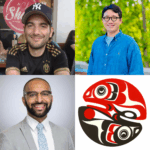CSDE Welcomes 3 New Affiliates
Posted: 9/4/2025 ()

CSDE is pleased to introduce three of our new UW Research Affiliates! Hyungmin Cha (Assistant Professor, Sociology) is a demographer and medical sociologist whose research investigates how socioeconomic resources and family ties shape health inequalities across the life course. Raheem Chaudhry’s (Assistant Professor, Evans School of Public Policy) research focuses on how public policy and political institutions can expand access to opportunity for all individuals, particularly those from disadvantaged and historically marginalized communities. José Alavez‘s (Assistant Professor, Geography) research brings together critical cartography, digital humanities, pluriversal design principles, and Global South approaches to transnationalism, exile, and diaspora. Learn more about each affiliate in the full story!
- Hyungmin Cha – Hyungmin (Min) Cha is a demographer and medical sociologist whose research investigates how socioeconomic resources and family ties shape health inequalities across the life course. His work centers on dementia, caregiving, and aging, with a particular focus on how social and economic disadvantages accumulate and are reproduced across generations. His research has appeared in leading journals such as Demography, Social Forces, Journal of Marriage and Family, Social Science & Medicine, and Journals of Gerontology: Social Sciences, among others. He also pursues global comparative studies using harmonized international data to examine how contextual differences influence aging and cognitive health.
- Raheem Chaudhry – Raheem’s research focuses on how public policy and political institutions can expand access to opportunity for all individuals, particularly those from disadvantaged and historically marginalized communities. Most of his current research examines the impacts of social and housing policy on well-being. Recent work focuses on the effects of growing up in public housing on children’s long-run outcomes, the consequences of minority enfranchisement on local public finances and the structure of government, and the impacts of land-use regulations on housing markets and neighborhood demographics. He received his PhD in Public Policy from the University of California, Berkeley and his Masters in Public Affairs from the University of Texas, Austin. Prior to receiving his PhD, he conducted research on a range of issues affecting low-income families at the Center on Budget and Policy Priorities.
- José Alavez – José Alavez’s research brings together critical cartography, digital humanities, pluriversal design principles, and Global South approaches to transnationalism, exile, and diaspora. He focuses on co-creating collaborative and creative mapping practices and representations that reveal the ongoing and multiscalar geographies of migration across the Americas. Prior to joining the University of Washington, he worked as a postdoctoral researcher at the University of Illinois Urbana-Champaign’s (UIUC) Healthy Regions and Policies Lab (HEROP), where he co-led the development of a community-focused data visualization toolkit on social determinants of health grounded in human-centered design and design justice principles. His postdoctoral work also included co-creating workshops alongside community and grassroots organizations to co-design ChiVes, a dashboard for environmental justice in Chicago. Additionally, he co-produced in-depth interviews for the U.S. COVID Atlas as a means to humanize and complement its quantitative data. José holds a Ph.D. from Concordia University’s (Montreal) Geography, Planning, and Environment Department. For his doctoral dissertation, he employed deep mapping methodologies to study the stories of individuals who endured the death of a loved one in the context of migration. His work illustrated how deep maps, through multiple analytical and artistic displays, reveal that death in the context of migration is not the end of a story, but the beginning and extension of many others. He also holds a Master’s degree in Geomatics from CONACYT’s Research Center of Geospatial Information and a BA in Human Geography from the Metropolitan Autonomous University in Mexico City.